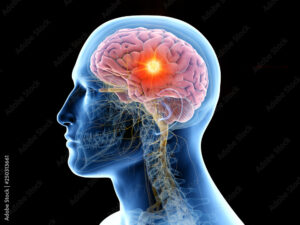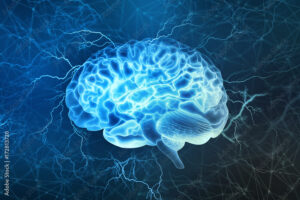 human brain visualization
human brain visualization
📢 Follow Us on Social Media
Brain Health is a Critical Component of Overall Wellness: Essential Sleep, Diet, and Lifestyle Resolutions for 2025
Brain health plays a vital role in overall wellness, affecting memory, focus, emotional resilience, and cognitive function. Medical News Today’s December 2024 article, “Brain health, sleep, diet: 3 health resolutions for 2025,” offers practical, science-backed steps to protect and supercharge your brain in 2025. These strategies address common challenges like stress and aging with manageable lifestyle changes.
Quality sleep is essential because it helps the brain clear toxins and strengthen memory. Experts recommend 7 to 9 hours of sleep to support brain cleansing processes linked to reducing the risk of neurodegenerative diseases. Sticking to a consistent sleep schedule and limiting caffeine after mid-afternoon are practical ways to improve sleep quality.
📰 Also Read This:
The article highlights sleep, diet, and lifestyle habits as key areas to enhance brain health. By focusing on these resolutions, people can build a stronger mental foundation for the year ahead.
Why Brain Health Matters
Brain health impacts both daily cognitive abilities and the broader aspects of personal well-being. Its influence extends beyond thinking skills to emotional balance and physical health. Maintaining brain function helps people perform tasks efficiently and supports a fulfilling lifestyle over time.
Connections Between Cognitive Function and Wellness
Cognitive function includes memory, attention, problem-solving, and decision-making. When these abilities are strong, people experience better productivity and emotional regulation.
Poor brain health can lead to confusion, irritability, and difficulty completing everyday activities. This may increase stress and reduce motivation, affecting overall wellness.
Boosting brain function through healthy habits like adequate sleep, a balanced diet, and mental exercises fosters sharper focus and emotional resilience. This connection shows how crucial brain care is to maintaining mental clarity and mood stability.

Impact on Long-Term Quality of Life
Brain health plays a vital role in aging well and avoiding cognitive decline. Conditions like dementia and Alzheimer’s disease have ties to prolonged neglect of brain health.
Sustaining brain function can delay or reduce risks associated with these conditions, supporting independence and quality of life in later years.
Investments in brain health improve the ability to handle daily challenges and preserve social connections. This results in better mental and physical outcomes, extending overall life satisfaction.
| Key Factors | Effects on Quality of Life |
|---|---|
| Healthy sleep habits | Reduce the risk of neurodegenerative diseases |
| Balanced nutrition | Support neuronal repair and function |
| Regular cognitive activity | Preserve memory and processing speed |
Prioritize Sleep for Optimal Cognitive Performance
Consistent quality sleep supports brain detoxification, strengthens memory, and prepares the mind for daily challenges. Establishing a structured sleep schedule and minimizing activities that disrupt circadian rhythms enhances cognitive function and emotional stability.
The Role of Sleep in Clearing Brain Toxins
During deep sleep, the brain activates its glymphatic system, which clears metabolic waste, including beta-amyloid proteins linked to Alzheimer’s disease. This clearance reduces inflammation and protects neural connections essential for memory and learning.
Research shows that inadequate sleep impairs this cleaning process, allowing toxin buildup that contributes to cognitive decline. Adults require 7 to 9 hours of uninterrupted sleep to optimize brain detoxification mechanisms.
Establishing a Consistent Sleep Routine
A regular sleep schedule—going to bed and waking at the same times daily—improves circadian rhythm stability. This consistency enhances sleep quality, facilitating better memory consolidation and emotional regulation.
Consistency also strengthens signaling between brain regions involved in attention and executive function. Experts recommend avoiding drastic weekend sleep pattern changes to maintain this rhythm effectively.
Reducing Screen Time Before Bed
Exposure to blue light from screens suppresses melatonin production, delaying sleep onset and reducing sleep depth. Limiting screen use at least one hour before bedtime supports natural melatonin cycles.
Alternative activities—reading printed books or meditative practices—help prepare the brain for sleep. Using “night mode” settings on devices is less effective than reducing overall screen exposure before rest.
Eat for Brain Power: Dietary Resolutions
A brain-boosting diet focuses on specific nutrients, balanced meal planning, and limiting processed foods. These choices support memory, focus, and overall cognitive function.
Nutrients Essential for Brain Function
Certain nutrients play a direct role in brain health. Omega-3 fatty acids, found in fatty fish like salmon and flaxseeds, support neural communication and reduce inflammation. B vitamins, especially B6, B9 (folate), and B12, are crucial for energy production and neurotransmitter synthesis.
Antioxidants such as vitamins C and E protect brain cells from oxidative stress. Minerals like magnesium and zinc aid in nerve signaling and cognitive function. A diet rich in leafy greens, nuts, berries, and whole grains typically supplies these vital nutrients.
Planning Balanced Meals
Balanced meals that combine protein, healthy fats, and complex carbohydrates provide steady energy for the brain. Protein sources such as lean meats, legumes, and tofu support neurotransmitter production. Healthy fats, including avocados and olive oil, improve cell membrane integrity.
Incorporating colorful vegetables and fruits ensures adequate vitamins and antioxidants. Portion control and regular meal timing help maintain consistent blood sugar levels, preventing cognitive dips during the day. Hydration also plays a role; water supports concentration and mental clarity.
Reducing Processed Foods
Processed foods often contain excessive sugars, unhealthy fats, and additives that can impair brain function. High sugar intake is linked to inflammation and impaired memory, while trans fats have been associated with cognitive decline.
Minimizing consumption of fast food, sugary snacks, and heavily processed items reduces these risks. Instead, choosing whole foods promotes better vascular health, which supports blood flow to the brain. Labels should be read carefully to avoid hidden sugars and unhealthy fats in packaged foods.
Daily Habits and Lifestyle Changes
Small but consistent adjustments in daily life can significantly impact brain function. Adopting effective stress management and maintaining regular physical activity are essential strategies to enhance mental clarity and cognitive resilience. These practices support brain health by reducing harmful inflammation and promoting neuroplasticity.
Managing Stress for Mental Clarity
Chronic stress triggers excess cortisol, which can impair memory and cognitive processing. Managing stress through mindfulness techniques, such as meditation or deep breathing, helps lower cortisol levels. This promotes clearer thinking and better emotional control.
Establishing a daily routine that includes breaks and relaxation diminishes mental fatigue. Activities like journaling or spending time in nature have been shown to reduce anxiety and improve focus. Consistency in these habits helps protect the brain from long-term damage caused by stress.
Professional support, like cognitive behavioral therapy, may be necessary for some. Prioritizing stress management methods strengthens brain function and helps individuals supercharge their brain in 2025.
Physical Activity and Brain Health
Regular exercise increases blood flow to the brain, delivering oxygen and nutrients that support neuron growth. Aerobic activities such as walking, cycling, or swimming are particularly effective in enhancing memory and executive function.
Physical activity also stimulates the release of brain-derived neurotrophic factor (BDNF), a protein that supports the survival of existing neurons and encourages new connections. This biological response helps maintain cognitive abilities and may delay age-related decline.
Experts recommend at least 150 minutes of moderate exercise weekly. Incorporating variety and staying consistent can maximize benefits, making physical activity a key daily habit to reinforce brain health.
Staying Sharp: Tracking Progress and Motivation
Measuring brain health progress and maintaining motivation require clear goals and reliable tools. Tracking improvements helps identify effective strategies and reinforces positive habits over time.
Setting Achievable Goals
Setting specific, measurable goals keeps brain health efforts focused and manageable. Goals like improving sleep quality by getting 7–8 hours nightly, practicing mindfulness for 10 minutes daily, or completing a weekly memory exercise are clear targets.
Breaking larger objectives into small, consistent actions increases success. For example, rather than aiming to “get smarter,” a goal might be “learn one new word each day” or “reduce screen time by 30 minutes nightly.” Tracking these incremental steps creates a sense of accomplishment.
Reviewing goals regularly allows adjustments based on progress or changing needs. It also prevents burnout by keeping expectations realistic. Written goals or checklists are simple tools that support commitment.
Using Technology to Monitor Brain Health
Modern devices and apps provide detailed insights into brain-related behaviors and functions. Sleep trackers measure duration and quality, guiding improvements to boost memory and focus.
Cognitive training apps offer exercises tailored to enhance attention, problem-solving, and processing speed. Many include performance analytics to highlight strengths and weaknesses over time.
Wearable devices often combine physical and mental health data, linking exercise, heart rate, and sleep patterns, which all impact brain health. They can send reminders and reinforce routine behaviors.
Users should select tools validated by research to avoid misleading data. Combining tech with self-reported experiences provides the most comprehensive understanding of brain health progress.
🔥 Affordable Digital Services in Kenya – 2025
Need a website or creative support? We offer high-quality services at the best market rates in Nairobi:
- Web Development: From KES 15,000 – Blog, Church, Company or NGO websites
- Web Hosting (1 Year): KES 2,500 – 6,000 with SSL + email
- Domain Name (.com): KES 1,000 – 1,500
- Graphic Design (Posters/Flyers): KES 500 – 2,000
- Video Editing (YouTube & Socials): KES 1,000 – 7,000
✅ Company, Church & Blog websites are FREE (Terms apply – you only pay hosting & domain).
📞 Let's talk on WhatsApp: +254 754 537854






